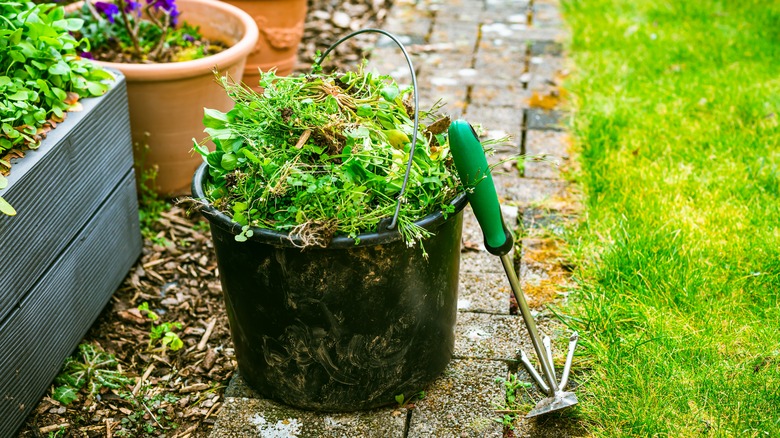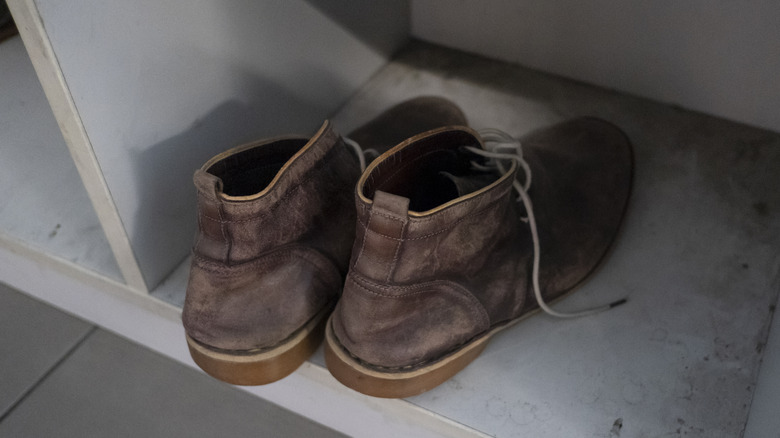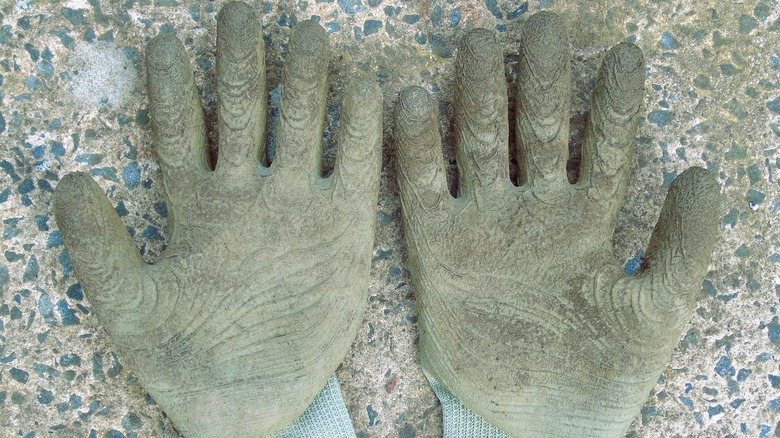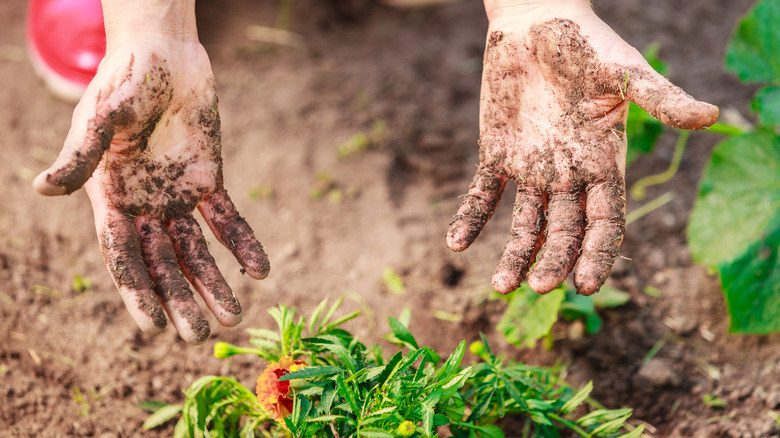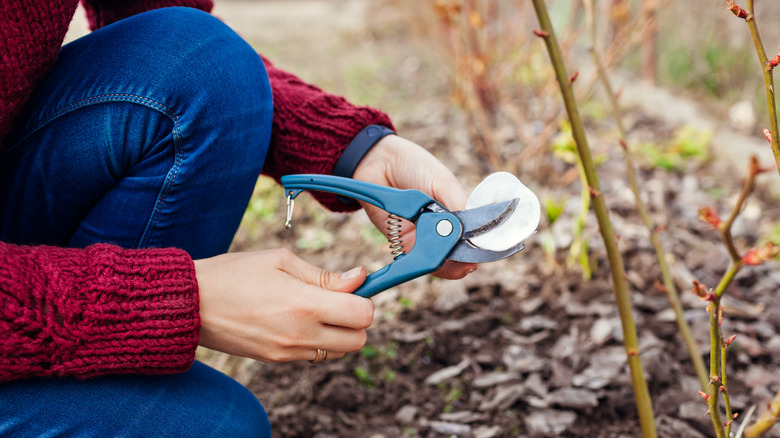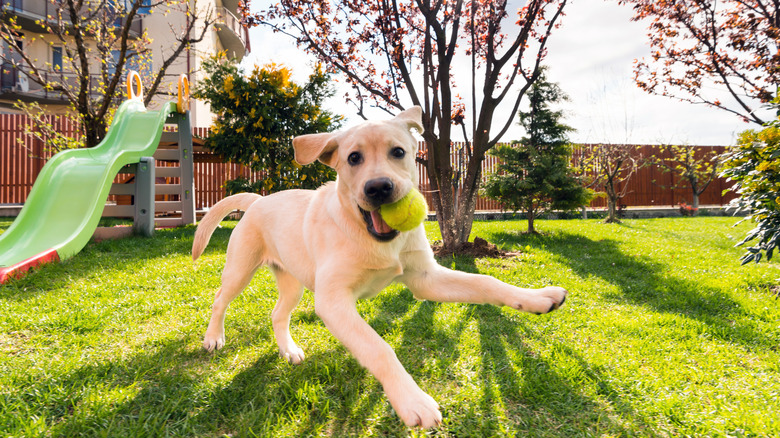5 Things You Should Always Do After Weeding, According To Our Master Gardener
Exposure to plants that can cause an itchy rash is a sort of occupational hazard for a gardener. Not everyone is sensitive to such plants, but for those who are, exposure to "https://www.housedigest.com/1553720/how-to-tell-difference-between-poison-oak-poison-ivy-weed/">poison ivy, poison oak, or bittersweet in the garden can cause an itchy, uncomfortable, painful rash that lasts for weeks. While it may not always be possible to avoid encountering these plants, it's possible to prevent a severe rash by cleaning up thoroughly after exposure, including clothing, tools, gloves, and even pets.
Wearing gloves as a preventive is good for avoiding contamination from well-known problem plants like poison ivy, poison oak, and bittersweet, but also from other plants, said our Master Gardener and Garden Editor Tiffany Selvey, in an exclusive interview with House Digest. "While poison ivy and poison oak affect many people, other plants, like wild parsnip, can cause severe burn-like blisters. When you are removing plants that you can't identify, it's always a good idea to wear long sleeves and pants, and especially gloves when you're weeding."
In addition to wearing gloves, long pants, and long sleeves, wearing solid shoes and socks covering any exposed skin can also help protect your skin from contamination. The toxic oil in poison ivy and bittersweet is known as urushiol. It is colorless and clings to skin, fabric, and most surfaces, and can continue to be a source of contamination for months. It's important to know that burning these plant materials is also dangerous, as the smoke can contain traces of the toxic oils and can contaminate the lungs or respiratory tract. Be sure to dispose of these plants away from your burn pile or compost heap."https://www.healthlinkbc.ca/health-topics/poison-ivy-oak-or-sumac-tips-washing" target="_blank" rel="noreferrer ugc nofollow">
Don't bring it in the house
Since the oils in plants that can cause a rash are often invisible, it's impossible to know if your clothing or other items have been contaminated. So, it's a good rule of thumb to avoid bringing your gardening clothes, shoes, gloves, or tools into the house where they might leave oil lingering on furniture or towels. It's especially important to keep your garden gloves separate until they can be cleaned properly, as these may have had frequent contact with the weeds and plant materials in question.
In an exclusive interview with House Digest, Master Gardener Tiffany Selvey said: "If possible, get out of your clothes and gloves before you touch anything in the house. Disrobing just inside the door isn't always possible, but removing gloves and shoes outside and washing your hands or showering immediately after removing potentially affected clothing can help a lot." Leaving the clothes in a trash bag before they go in the wash is a good way to keep them separate from other clothing or household objects.
Just like mud, the soles of your shoes or boots can pick up toxic plant oils, and tracking this through your home could lead to unexpected problems. Leave your shoes outside, and if possible, wash them before wearing them again. If your garden shoes aren't washable, at least wash the soles and your shoelaces before wearing them again, and wipe them down with a soapy, damp sponge to remove traces of plant oils.
Wash clothes, gloves, and shoes
Always wash your gardening clothes and gloves immediately after possible exposure to toxic plant oils. Washing in hot water with a neutral solid detergent works best. It's also not a bad idea to wash gardening clothes and gloves separately from other clothing, just in case. Depending on what kind of garden gloves you have (heavy canvas ones are best for dealing with toxic weeds), different materials tend to absorb plant oils differently.
Most garden gloves can be washed in the machine and dried separately to prevent shrinking if they're made of cotton or wool. In an exclusive interview, Tiffany Selvey told House Digest, "Gloves can generally be tossed in the washing machine and washed in hot water unless they are leather, so find care instructions if possible." A soap that dissolves grease, like Dawn dish soap, is best for cleaning skin and clothes exposed to the urushiol in poison ivy. You could use this soap with a damp sponge to wipe off leather gloves and let them dry.
Some gardeners buy cheap vinyl gloves specifically for dirty jobs or for dealing with noxious weeds. This way, you can simply dispose of the gloves afterward without worrying about any plant oils left behind. Don't use thin plastic disposable gloves, as they're not really sturdy enough for gardening and may tear, exposing your hands.
Wash exposed skin
It's imperative to wash immediately and thoroughly after being exposed to poison ivy or other toxic plants. Some soaps and ointments are available explicitly made for gardeners to help prevent the spread of rashes from plant oils. These may vary in effectiveness from person to person. However, one method that seems to work well is using Dawn dish soap, an effective cleaner with good oil-dissolving properties.
In a House Digest exclusive, Master Gardener Tiffany Selvey recommended "Washing your hands...immediately," as touching things can spread the oils faster. Soap up thoroughly with Dawn and use paper towels to dry off. It's also not a bad idea to carefully wash off objects you've touched before washing your hands, including the steering wheel of your car, car door handles, and door knobs, as well as your phone. Use a damp soap sponge and dry them off carefully afterward.
Urushiol, the clear plant oil found in poison ivy and bittersweet, can make its way almost anywhere on the body: behind the ears, under the nose, near the eyes, on the feet, on the stomach, etc. To make sure you don't spread the oil and cause an uncomfortable rash, use a clean sponge with Dawn dish soap to wash thoroughly in the shower. Do this before using other soaps or shampoos, which might spread the oils further.
Disinfect tools
Cleaning tools regularly, especially after weeding or pruning, is always a good idea, according to Master Gardener Tiffany Selvey. "There are so many viruses, fungal issues, and bacteria that can be spread by tools that it's just generally good practice to clean and disinfect your tools on a regular schedule."
Plant oils can linger on surfaces for an extended period of time. In a House Digest exclusive interview, Selvey said, "Kaiser Permanente recommends washing all clothing, tools, gloves, and other accessories" after working with noxious weeds "because these plant oils can remain active for months!" In the same way that you want to avoid infecting humans, you want to prevent cross-contamination with other plants: "When you're dealing with a plant you know to be diseased, like pruning a tree with fire blight, you should clean your blades between every cut to try to stop the disease from spreading from one area of the tree to another. Cutting tools should also be thoroughly disinfected before using them on another plant," says Selvey.
Different kinds of garden tools may require different cleaning methods, especially if they have wooden or metal parts that may need oiling or rust prevention. "Tools should have all dirt and debris removed, but the rest of the process just depends on the tool. The University of Minnesota Extension recommends a few options from spray-on disinfectant to a dilution of bleach."
Wash pets if they've been exposed
One thing gardeners may not think of is whether their pets may have been exposed to toxic plants like poison ivy or poison oak in the garden. Since poison ivy generally does severely affect dogs or cats, it's easy to forget that their fur can carry the oil just like any other surface. If your pet likes to hang out in the garden with you or wanders where they might be exposed to these plants, it's a good idea to bathe them regularly so they don't contaminate furniture or bedding.
Wash your pet's bedding and lay down an old sheet or towel on it to absorb any plant oils that might be on their fur until you can get them in the bath. Just as when they're exposed to skunk spray, you should try to bathe your pet immediately. Use a de-greasing soap like Dawn dish soap and dry them thoroughly afterward, ensuring they have clean bedding.
Be aware that petting your dog can cause plant oils on your hands. At the very least, wiping your hands down with a damp sponge and Dawn dish soap can help remove the oils on the surface of their fur. Wash your hands thoroughly. If your pet is exposed and develops symptoms, be sure to consult your vet.
